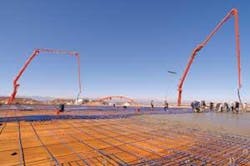Click here to enlarge imageAccording to AMSA, the key to continued progress in further limiting CSOs lies in the development and approval of long-term control plans (LTCP) for every CSO community to achieve compliance with water quality standards. AMSA believes National Pollutant Discharge Elimination System (NPDES) permits, not enforcement or consent orders, should be the primary tool for imposing these LTCP obligations.
“A major impediment to meeting the goals of the CSO Control Policy (i.e., compliance with water quality standards), is that the existing standards are not based on the actual uses of CSO-impacted waterbodies,” AMSA wrote in it’s action plan. “The impact of this disconnect is the development of LTCPs that can never achieve full compliance with all water quality standards under all operating conditions.”
The CSO Control Policy recommends that use-attainability analyses be used to determine the appropriate use for a particular receiving water, but this step in the LTCP process is poorly defined and rarely successful, AMSA said. As a result, CSO communities are unable to develop LTCPs that regulatory agencies consider approvable.
To remedy these problems, AMSA believes that EPA and the states must be authorized to provide CSO communities with site-specific criteria that will be used to evaluate their LTCPs. These criteria must be established based on appropriate uses for the receiving water and must contain achievable goals based on the goals of the CSO Policy.
EPA, water quality standards authorities, and CSO communities should work together to ensure that water quality standards are reviewed and revised as appropriate to reflect the actual uses of CSO-impacted waterbodies.
“In the absence of this approach, what will likely dominate the horizon is the uneven application of standards, expensive and unnecessary construction, and resource-wasting enforcement actions,” AMSA said.
SSO Policy
AMSA believes a national policy on SSOs must be developed. Without a regulatory policy and/or program on SSOs, EPA’s current enforcement policies are forcing many communities to commit tremendous resources in a fruitless attempt to eliminate all SSOs, AMSA said.
AMSA recommends the development of a national SSO policy modeled after the CSO Control Policy. The CSO Control Policy acknowledges that a zero tolerance policy for CSOs is not appropriate. AMSA believes that the same approach should apply to SSOs. AMSA recommends the following:
• Develop a national SSO policy that enables the use of holistic, watershed-based approaches that will ensure that available resources can be used to provide controls for the wet weather overflow problem - whether CSO, SSO, and/or stormwater - that is having the greatest impact, thus maximizing environmental and public health benefit;
• Establish a national municipal collection system permitting program, which will include satellite collection systems, using the management, operation, and maintenance (MOM) concept as the standard for measuring compliance, and including a capacity assurance standard; and
• Conduct any additional scientific studies necessary on the issue of environmental or public health impacts to ensure sound regulatory and enforcement policy (e.g., more work is needed to further define the relative impacts of urban stormwater runoff and overflows and to discern between human and nonhuman sources of pathogens).
AMSA is working on a model SSO policy that will contain the specific language that municipalities believe is critical for a workable SSO program. AMSA plans to share this proposal with EPA and Congress when it is completed in early 2005.
AMSA will distribute its Action Plan to all members of Congress with the goal of ensuring that wet weather policies remain a national priority. For additional information on the Action Plan contact AMSA’s Director of Regulatory Affairs, Chris Hornback at 202/833-2672 or [email protected]



